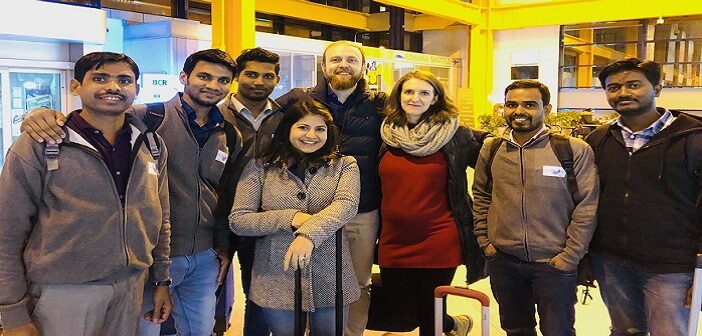
India is at a unique advantage of the demographic dividend. The skilled workforce is in demand not just in India but across the globe among various industry sectors. Magic Billion, an organization set up in 2018 to address the talent inequity across the globe, and to fill in the gaps between skill sets and job roles, and to provide an international opportunity to the skilled Indian workforce. In this Skill Story Ms. Aditi Banerjee, Co-Founder, Magic Billion, shares timely insights on how job scenario and demand in the post-COVID-19 world, opportunities for Indian talent across the globe, taking advantage of demographic dividend, and much more. Know more from our conversation below.
Q: How is Magic Billion helping India in taking advantage of the demographic dividend?
A: There are many global opportunities for Indian talent, which remain unknown to the Indian talent market because matchmaking between global employers and Indian talent has not been enabled through a formal route so far. What is required is for an organization, who understands the Indian talent space completely, to engage with global customers, looking for talent similar to that which is available in the Indian landscape, and create matchmaking.
In people terms, this matchmaking is known as competency mapping, wherein the competencies for the job role, say a welder, who needs to work in the shipbuilding industry in Russian ports, can be matched to the competencies of an Indian welder with similar skills.
This competency mapping is possible today because of the existence of more than 6000 qualification packs created by the National Skill Development Corporation (NSDC), and the Sector Skills Councils. With Indian talent moving to global workspaces, aided by organizations by like Magic Billion, India is greatly able to take advantage of its demographic dividend and claim its rightful place, as the Skill Capital of the world.
Q: With increasing focus on self-sustainability across economies in the world, will global organizations be open to recruiting people from other countries?
A: While there is some truth in the fact that there is an increasing focus on self-sustainability across economies in the world, the hunt for a high-quality talent by employers at the global stage has only increased because of the focus on quality.
The world is so competitive and so focused on quality that global employers cannot find enough high-quality talent in their countries, especially in the industrialized world. So, while there is a focus on self-sustainability, it is not at the cost of losing global competitiveness.
As Magic Billion, we meet with quality employers across many nations and we are finding some interesting trends which counter the paradigm of self-sustainability. For example, the German Skilled Immigration Act, is a new law that expands the possibilities for qualified professionals to come to work in Germany. Now, it´s easier for skilled workers with vocational, non-academic training from non-EU countries to migrate to Germany in order to work. Similar examples can be found in the change of visa rules of countries like Australia, Canada, etc. I feel, if India continues to enhance the quality of its workforce there will definitely be a very large space available to Indian talent to occupy in the global workspace.
 Q: What changes can be seen in different sectors in the post-COVID-19 world?
Q: What changes can be seen in different sectors in the post-COVID-19 world?
A: Well, for one, there is a much greater focus on quality, as far as talent is concerned. Mechanization has become a critical aspect in the manufacturing industry and there is no doubt that Indian talent will need to be trained on state-of-the-art manufacturing equipment, in what is being touted as Industry 4.0.
Having said that, the green shoots that are emerging in the post-COVID-19 world indicate that countries would want to bring in talent for the long term, from countries like India. We are today, in India, fortunately living in the age of the demographic dividend.
As Magic Billion, we are in the final stages of signing contracts with employers in countries like Canada and Australia, for entry-level talent, which we will skill in India, as per quality norms of the destination countries. Then they would move on to these industrialized countries, in order to take their rightful place in the global workplace. They will be sought-after talent in the years to come, as they will have technical certifications in the destination countries, and will work from floor-level upwards. The situation is a little different in the service industry, wherein the post-COVID-19 world we are seeing an uptick in the requirement of high-quality talent in the hospitality and healthcare sectors, because of enhanced demand.
Q: Could you elaborate on the changing nature of jobs and hiring scenarios due to advancements in technology and in the current COVID situation?
A: I would say that the changing nature of jobs varies by sectors, because of both these factors, advancements in technology and in the current COVID-19 situation. The IT hardware, software, and networking industry are all seeing rapid changes in competency requirements in talent, and those who can ride this galloping horse, and remain cutting edge with their skills, can rule the global market. Today we have requirements of top-class Indian IT talent from Sweden, the US, Germany, and Japan.
However, in the Healthcare industry, say for the nursing roles, global employers seek mostly the same skills in Indian talent, as they sought pre-COVID-19. Most other industries lie somewhere in between. From the lens of global talent mobility, it is important for professionals aspiring to work in the global market to be updated on their skills. Of course, this is much more a requirement in the IT and manufacturing sectors.
Q: What are some of the sectors in which global organizations are looking to hire an Indian workforce and why?
 A: You know, when we started Magic Billion, we too were asking ourselves this question, what are some of the sectors in which global organizations are looking to hire an Indian workforce. Over the past two and half years, with engagements in more than 20 talent deficient countries, we would say there is hardly any industry sector in which employers are not deficient of talent in some parts of the world. Let me quote from a Study by Manpower Group of shortages of skills globally in 2019.
A: You know, when we started Magic Billion, we too were asking ourselves this question, what are some of the sectors in which global organizations are looking to hire an Indian workforce. Over the past two and half years, with engagements in more than 20 talent deficient countries, we would say there is hardly any industry sector in which employers are not deficient of talent in some parts of the world. Let me quote from a Study by Manpower Group of shortages of skills globally in 2019.
As can be seen in the figure, almost all skills are in demand. Magic Billion has got inquiries for Indian talent in fields of Ship Building, Oil and Gas, Agriculture, IT, all kinds of Manufacturing, Hospitality, Healthcare, Apparel, Food Delivery, Maintenance, and a host of others.
So, the question we ask ourselves today is, which are those geographies, clients, and job roles that we want to support Indian talent with? The talent landscape is rapidly changing from being supply-driven to demand-driven. Of course, no global employer will accept any compromise in the quality standards of professionals.
Related Article: Need for strategic thinking and international collaborations to make India Skill Capital of the world – Read More: https://nationalskillsnetwork.in/basab-banerjee-skilindiglo/
Q: How should Indian students and skilled workforce prepare and train themselves to be able to explore global opportunities?
A: This is an extremely relevant question. There are many professionals who are keen to invest in the skill development space in India, but they are unanimous in their opinion that the Indian youth feel that training them is the responsibility of the society and government, and it is not their responsibility.
Over the last decade, the massive incentives were provided by the government to the youth through the Skill India program. But there was hardly any skin in the game for Indian youth, as these trainings were mostly funded by the government.
The global talent environment is extremely competitive, and the Indian youth who are aspiring to work in the global workplace, earning 10X or more of the salaries paid to Indian workers, and working shoulder to shoulder with the best of the land globally will need to invest their time, energy and fund their skill development to global standards.
The good news is that there are many skills development organizations today in India which are able to provide Indian talent with skills that will find traction in the global marketplace. Skill development of professionals is also dependent on where they want to be. If they want to work in the Indian environment, they will need to acquire skills of a standard required by the Indian employer, however, if they want to work in the global workplace they will have to raise their skills a few notches higher, and there are enough and more players in the market today who will be able to guide them and also point them to suitable skill development institutions. Even your Magazine “Skill Times from NSN” plays a big role in showcasing quality skill development. And organizations like ours, Magic Billion, are always there to help to aspire, well trained Indian candidates achieve their goal of work in their dream destinations, in the professions of choice.












